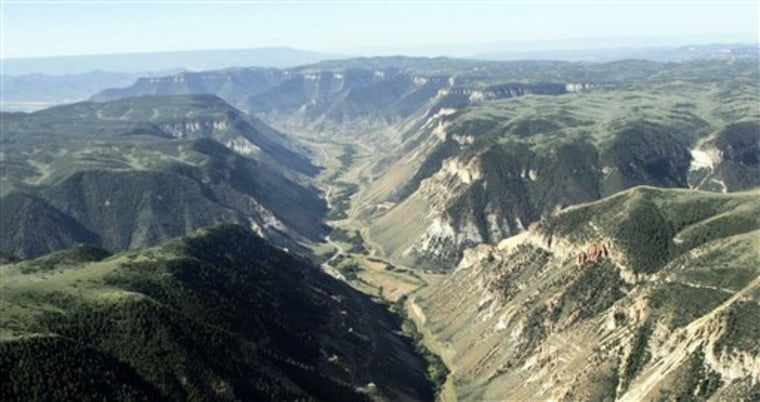Heralding oil shale as “a domestic resource with staggering potential,” the U.S. Bureau of Land Management has selected the first companies likely to earn a chance to start exploiting federal lands in Colorado and Utah.
BLM Director Kathleen Clarke announced the bureau had narrowed a field of 16 contenders for experimental projects, choosing six companies that, subject to environmental reviews, could be awarded leases to work 160-acre parcels of federal land by summer.
Taking direction from President Bush's Energy Act, Clarke said the reserves contain a 100-year domestic supply of oil, although it's locked up in layers of hard rock and the technology for economically recovering it is still evolving.
Oil shale generally refers to any rock that contains solid tarlike materials released as petroleum-like liquids when the rock is heated.
“The United States holds significant oil shale resources underlying a total area of 16,000 square miles,” the BLM said in a statement. “This represents the largest known concentration of oil shale in the world and holds an estimated 800 billion barrels of recoverable oil — enough to meet U.S. demand for oil at current levels for 110 years. More than 70 percent of American oil shale is on Federal land, primarily in Colorado, Utah, and Wyoming.”
Activists want ‘long, hard look’
Environmentalists have raised concerns about whether the technology will minimize the impact on natural areas.
“We really need to take a long, hard look at all aspects of this technology, before we make major commitments of federal financial and natural resources to it,” the Wilderness Society’s Steve Smith said at a congressional hearing last year.
The announcement amounts to tentative approval for experimental works, but more significantly it puts major oil companies and a few small players in line for leasing larger federal tracts for commercial operations that could start as early as mid-2007.
The front-runners that win approval for experimental works will get first rights to lease an additional 4,960 acres of land surrounding their 160-acre parcels — all chosen for their proximity to the richest or thickest oil shale deposits in western Colorado and eastern Utah.
The reserves overlap into a corner of Wyoming, which is expected to be part of the commercial leasing program, but the only application filed in Wyoming for experimental works was rejected by the BLM as incomplete.
Companies and areas
In Colorado, Shell Frontier Oil & Gas Co. won tentative approval to work three separate parcels of federal land, subject to environmental reviews. Shell is perfecting a method of baking shale oil from the ground using heating rods drilled into layers of rock, an alternative to mining.
The BLM advanced variations on that "in-situ" technique proposed by three other companies: Chevron Shale Oil Co; EGL Resources, Inc., and Exxon Mobil Corp. Each of those companies won tentative approval to work a parcel of federal land that, like Shell's, are inside Colorado's Rio Blanco County.
In eastern Utah, Oil-Tech Inc. and Oil Shale Exploration LLC survived the elimination round with plans to bake shale oil out of rock using a retort, or stack of furnaces, each taking advantage of a supply of 30,000 tons of oil shale left outside the abandoned White River mine.
Background and options for providing feedback are online at ostseis.anl.gov.
